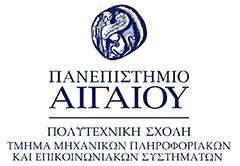Εκπαίδευση - Σπουδές
- PhD Candidate in Open Data and Data Journalism, University of the Aegean (Greece) - School of Science.
- Master of Science (MSc) in Internet Technologies and Enterprise Computing, Newcastle University (United Kingdom) - School of Computing Science.
- Master of Engineering (MEng) in Information and Communication Systems Engineering, University of the Aegean (Greece) - School of Science.
Ερευνητικά Ενδιαφέροντα
- Open data
- Data Journalism
- Fake News
- Open Data as a News source
- Media Credibility
Διδασκαλία
Δημοσιεύσεις σε Διεθνή Περιοδικά (Journals)
Copyright Notice: This material is presented to ensure timely dissemination of scholarly and technical work. Copyright and all rights therein are retained by authors or by other copyright holders. All persons copying this information are expected to adhere to the terms and constraints invoked by each author's copyright. In most cases, these works may not be reposted or mass reproduced without the explicit permission of the copyright holder.
Abstract
The generation of social and economic value from the vast quantities of data opened by governments has been much lower than the initial expectations. It requires the development and cooperation of ecosystems composed of various public, private, and non-profit actors. For the development of these ecosystems in order to generate social and economic value from open government data (OGD), necessary conditions are, on the one hand, the availability of a critical mass
of OGD and, on the other hand, the existence of some level of homogeneity and interoperability among the numerous portals and websites providing them, which enables their combined exploitation that increases the potential for value generation from them. This paper focuses on the latter and develops the Technical, Semantic, Legal, and Organizational (TSLO) Interoperability Framework, a conceptual tool designed to provide a structured multi-dimensional assessment of the interoperability capabilities of OGD infrastructures, based on the ‘European Interoperability Framework’ (EIF) as well as relevant OGD literature. This TSLO framework has been applied for the assessment of the above main dimensions of the interoperability of the OGD infrastructures of the Greek local government administration institutions of all three layers (decentralized, regional, and municipal). After this application, nine interviews were conducted with nine municipalities that do not provide OGD in order to gain a deeper understanding of the reasons for this. The results of this first application of TSLO revealed not only the low participation of Greek local government institutions, and especially of the municipalities, in the OGD movement (with only 8 out of the 332 municipalities providing open data on their portals or websites), but also the inconsistent implementation of this, especially with respect to the use of semantic technologies as well as the legal frameworks under which the open data are provided, resulting in low levels of interoperability among them. The interviews that were conducted revealed that the opening of some of their data was not a priority for them, as their limited resources had to be used for the development of internal information systems for increasing their efficiency, as well as e-services for the citizens, enabling them to conduct transactions electronically (through the Internet). Our study makes a contribution to the still limited body of research on OGD ecosystems, examining an important precondition for their development that has not been researched in previous literature; also, our framework can contribute to the increase of interoperability of OGD infrastructures and therefore to the increase of social and economic value generations for the OGD they provide
Επιστημονικά Συνέδρια (Conferences)
Copyright Notice: This material is presented to ensure timely dissemination of scholarly and technical work. Copyright and all rights therein are retained by authors or by other copyright holders. All persons copying this information are expected to adhere to the terms and constraints invoked by each author's copyright. In most cases, these works may not be reposted or mass reproduced without the explicit permission of the copyright holder.
Abstract
The development of ecosystems around open government data in order to generate social and economic value from them requires on one hand the existence of a critical mass of them and on the other hand some level of homogeneity and interoperability among the numerous portals and websites providing them which enables their combined exploitation. This paper presents the Technical, Semantic, Legal, and Organizational (TSLO) Interoperability Framework, a conceptual tool designed to provide a structured evaluation of the interoperability capabilities of open government data infrastructures. It incorporates the technical, semantic, legal, and organizational aspects of open government data provision, which
are crucial for developing interoperability between open data portals and websites, which enables the generation of high levels of social and economic value from them, so it can pave the way for creating open data ecosystems for this purpose. We are then applying this TSLO framework to examine from this perspective the
open data infrastructures of the Greek local government administration institutions of all three layers of it (decentralized, regional, and municipal). In particular, we examine the open government data portals and websites of the local Greek governments and provide a detailed analysis of them concerning the fore aspects of the framework. This first application of TSLO reveals not only the low participation of Greek local government institutions in the open data movement, and especially of the municipalities, where only 8 out of 332 municipalities provide open data on their portals or websites but also the inconsistent implementation of this, especially
with respect to the use of semantic technologies as well as the legal frameworks under which the open data provided. Finally, we propose the automation of the TSLO framework to facilitate the evaluation and standardization of open local government data infrastructure and expand the study to identify and address barriers to open data provision.
Abstract
Whilst there is a need for furthering the engagement of the universities in imbibing the Open Government Data (OGD) curriculum in their graduate and postgraduate courses, there has been no systematic research focused on the identification of the qualitative benchmarking regarding the curriculum of OGD-focused academic programmes. Benchmarking the OGD curriculum with the adoption of
best practices among the universities is pertinent given the significant role of the students and other faculty members in the value derivation and innovation pursuits in their current and futuristic capacities. Drawing inferences from the QS World University rankings, 2023, via the BEKA (benchmarking, evidencing, knowing, applying) analysis, this paper identifies the best practices in qualitative terms for
furthering dialogue and discourse among the university stakeholders and others in the OGD ecosystem. Specifically, a detailed course structure is provided for OGD courses which may serve as benchmarks for further foundation-laying of OGD curriculum in different varsities. As a first contribution towards identification of the best practices in the OGD-focused curriculum designing, the study contributes towards OGD literature, in general, and the benchmarking practices in OGD-focused discourse, in specific
Abstract
Extant research on Open Government Data (OGD) has remained confined to the grappling of issues linked with its conceptual, theoretical and empirical dimensions, however focusing on the supply of OGD physical capital (ODG portals, datasets, etc.), and to a lesser degree on the demand for it (e.g., needs of potential users), but not dealing with relevant OGD human capital (human knowledge and skills concerning OGD). Furthermore, research on meta-analysis or literature reviews has not expanded its scope to unravel the formation of OGD human capital, and especially how the OGD theme is being showcased across universities’ curriculum. The present research aims to contribute to filling this research gap, through an analysis of the OGD-related programs and courses offered at the graduate and post-graduate levels across the top-notch universities identified as per the indicators of the QS World University rankings, 2023. Our theoretical foundation is the widely recognized ‘Human Capital Theory’ from the economic science, which gives prominence to the importance of the human capital (human knowledge and skills) as an important complement of the classical physical capital (e.g., production equipment, ICT capital, etc.). Our findings indicate that there are only small number of courses concerning OGD in these top-notch universities; furthermore, a very small share of them have OGD an main topic, while most of them include only a part concerning OGD. Most of them focus on the exploitation of OGD of a specific thematic domain (mainly urban studies and health), and only a few deal with OGD in general. Furthermore, there is a prevalence of postgraduate courses, offered as part of MSC programs, followed by undergraduate courses, offered as part of BSC study programs, and to a much lesser degree short courses. Also, with respect to the objective of these OGD-related programs and courses, most of them aim at the generation of scientific value from OGD, while a smaller number aim at the generation of social-political value, and only a much smaller number at the development of economic value. Therefore, it can be concluded that the formation of OGD human capital by the examined universities is limited.
Βιβλία
Copyright Notice: This material is presented to ensure timely dissemination of scholarly and technical work. Copyright and all rights therein are retained by authors or by other copyright holders. All persons copying this information are expected to adhere to the terms and constraints invoked by each author's copyright. In most cases, these works may not be reposted or mass reproduced without the explicit permission of the copyright holder.
Κεφάλαια σε Βιβλία
Copyright Notice: This material is presented to ensure timely dissemination of scholarly and technical work. Copyright and all rights therein are retained by authors or by other copyright holders. All persons copying this information are expected to adhere to the terms and constraints invoked by each author's copyright. In most cases, these works may not be reposted or mass reproduced without the explicit permission of the copyright holder.
Επιμέλεια Πρακτικών Διεθνών Συνεδρίων
Copyright Notice: This material is presented to ensure timely dissemination of scholarly and technical work. Copyright and all rights therein are retained by authors or by other copyright holders. All persons copying this information are expected to adhere to the terms and constraints invoked by each author's copyright. In most cases, these works may not be reposted or mass reproduced without the explicit permission of the copyright holder.





 Download
Download